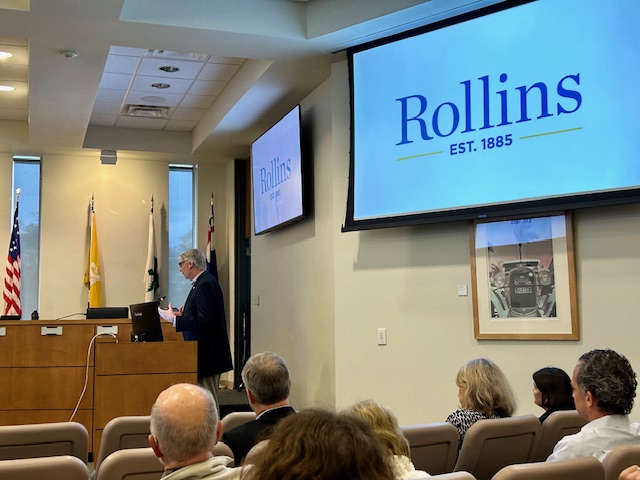
by Beth Kassab | Jan 25, 2024 | City Commission, News, Uncategorized, Zoning and Development
Commission postpones decision on Rollins faculty apartments
The liberal arts college offered a concession right out of the gate by reducing the number of units from 48 to 39, but commissioners wanted more
Jan. 25, 2024
By Beth Kassab
The City Commission on Wednesday postponed a decision on a request from Rollins College to build faculty apartments a few blocks north of Fairbanks Avenue from the liberal arts campus despite a significant reduction in units and new project renderings.
Rollins President Grant Cornwell immediately acknowledged nearby residents’ discontent over the proposal and offered to reduce the number of units from 48 to 39.
“We’ve heard the concerns about parking and we’ve heard concerns about density so we come here to you today prepared to build a smaller project than we originally proposed,” he said, explaining that he sees faculty apartments as “strategic” to the college’s mission and “nobody is making any money here … this isn’t a business deal.”
But that did little to quell concerns and several commissioners presented lists of additional demands and questions from the length of time Rollins must maintain the project as faculty and staff housing, to what defines faculty, the materials used to construct the building, potential mandatory solar power to the building’s aesthetics.
The number of stories and whether the roof is sloped or flat emerged as perhaps the biggest sticking point of the night. Typically buildings along that stretch of Welbourne Avenue are restricted to 2.5 stories with a sloped roof and dormer windows. But Rollins is asking for three story vertical construction with a flat roof, which is allowed just blocks away in the city’s Central Business District.
Becky Wilson, an attorney from Lowndes who represents Rollins, explained that the dormer windows would not work because the third level needs to be used for full units and sloped walls would interfere in the design.
“We also worked a little on the renderings,” she said, nodding to concerns expressed by residents at last week’s Planning & Zoning Board meeting about the architecture.
She emphasized that Rollins will continue to own and control the building and would prohibit tenants from draping items over the balconies or making them unsightly in other ways.
Some of the residents’ concerns conjured images of a fraternity house versus up to three-bedroom units for new professors and their families. A number of residents of the Douglas Grand condominium building said they feared their own units will drop in value because of Rollins’ planned framed construction with what they called too few architectural details to emulate the Spanish-Mediterranean style the main campus is known for.
“Please consider whether or not you would purchase a $1 million residence across the street from what would be at best an average maintained, subsidized apartment complex,” read one email to commissioners from a resident.
“It is the appearance of the rental facility that makes it even more distasteful,” read another.
“Not to sound snotty, but this is the type of apartment better suited for cities like Fern Park or Casselberry,” a resident wrote.
Wilson clarified that the apartments would not be restricted by income, but the college plans to charge rents based on affordability for people who earn up to 120%, or perhaps even more, of the area median income.
Cornwell has said he envisions tenure-seeking faculty who are early in their careers to utilize the units so they can afford to live near campus, where many home prices easily exceed $1 million.
As the meeting went on, it became clear there weren’t enough votes for Rollins to win approval, particularly after Mayor Phil Anderson said he wasn’t comfortable with a three-story building and other factors.
“For me, compatibility is less about intensity and more about what the building is going to look like,” he said.
Anderson urged residents to understand that whether the college pays property taxes on the property or not is up to federal and state rules governing tax-exempt organizations and a determination by the county property appraiser. Typically, non-profit groups — even big-monied ones like hospital systems AdventHealth and Orlando Health and major universities — don’t pay property taxes when the land is used to further the group’s mission.
City Attorney Kurt Ardaman said there is case law to support faculty housing as a purpose that would qualify for an exemption.
The City Commission voted unanimously to table a decision until its next meeting on Feb. 14.
WinterParkVoiceEditor@gmail.com
To comment or read comments from others, click here →
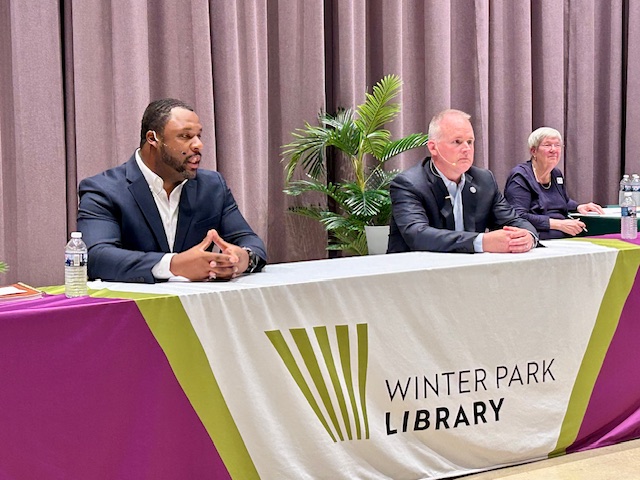
by Beth Kassab | Jan 23, 2024 | City Commission, Election, Library, News, Uncategorized, Zoning and Development
Two commission candidates offer views on growth, old library, Rollins apartments and more
Monday’s forum at the Winter Park Library was the first of the election season
Jan. 22, 2024
By Beth Kassab
Commission Seat 2 candidates Jason Johnson and Craig Russell faced off at a forum Monday night at the Winter Park Library, revealing some clear, if subtle, differences in their philosophies on questions such as what to do with the old library building, a proposal for Rollins College faculty apartments and the future of development in Winter Park. (Watch a recording of the event here.)
Stockton Reeves, the third candidate in the race, did not attend the forum. Carol Foglesong, the moderator from the Orange County League of Women Voters, announced Reeves was “caught out of town on his job and was not able get back … so it’s not that he didn’t show it’s that the job got in the way for tonight.”
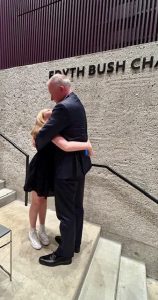
Jason Johnson shares a hug with his daughter after the forum.
That raised some confusion, however, because Reeves met in person on Monday with Winter Park residents involved in the Fix 426 effort at an Orlando office. He did not immediately respond to a question from the Voice about whether he was out of town during the forum, though he previously told the Voice he had a work conflict during the event that he was trying to reschedule.
Russell and Johnson, both first-time candidates for public office, showcased their knowledge and experience in the local community.
Both credited their children and families as their biggest accomplishments and appeared to agree on issues like examining how the city’s Community Redevelopment Agency, a special downtown tax increment district that the current City Commission is trying to expand, could play a role in providing more affordable housing.
They also agreed that recent increases in pay for police officers have made the department more competitive in hiring.
Neither expressed a firm opinion when asked whether Winter Park should let voters decide whether to adopt single-member districts or carving the city into sections that each elect a representative to the City Commission. Russell, who is Black, nodded to the merits of diversity several times during the forum. Winter Park has not elected a Black commissioner in more than 130 years.
“There isn’t enough data for me to answer,” said Russell, a teacher and coach at Winter Park High who also serves on the city’s Parks and Recreation Advisory Board and as a trustee for the Winter Park Library. “If there’s true representation that kind of solves that problem.”

Craig Russell poses with students who came out to support him at the candidate forum.
Johnson, an attorney and current chairman of the city’s Board of Adjustments, said he’s “always in favor of allowing voters to decide” and noted single-member districts have positives and negatives and he would want more information.
While both candidates largely described their future vision of Winter Park as keeping the look and feel of the city much the way it is today, some differences emerged.
On the Rollins College proposal for 48 new apartments aimed at providing attainable housing for faculty closer to campus, Russell signaled a willingness to find a way to make it happen.
“How do we make it work?” Russell asked of the project on New England Avenue that has drawn complaints from neighbors about its density, architecture and potential shortage of parking. “I don’t think the immediate answer is no … Rollins historically has been a good neighbor to us and it’s an opportunity for something we haven’t done here in Winter Park and I’m very open to hear more about it.”
Johnson said he didn’t want to express a firm viewpoint, but seemed more skeptical.
“I do think there is a need for housing for faculty and staff in the city, so I understand why Rollins wants to do it,” he said. “But I also understand some of the residential concerns.”
On the matter of the old library building, which continues to pose a conundrum for city officials since the City Commission recently rejected a second round of proposals that came in to redevelop the parcel, Johnson said he opposed selling the land. A sale has been brought up multiple times to raise revenue for other projects.
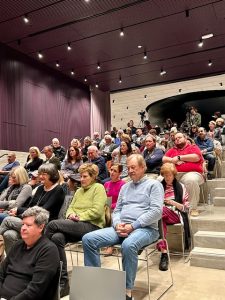
A packed crowd listens to candidates for Commission Seat 2 at the Winter Park Library.
He said a sale is on the “bottom of my list of priorities,” because “it’s a gateway and it’s too valuable of an asset to sell off for a few dollars today. I wouldn’t’ support that right now.”
Later in the forum, Johnson brought up one idea that’s been discussed, which is to turn the land into a small park space.
Russell said he would “have to lean on a bunch of contacts that I have to learn more about that situation” and expressed concern about the building falling into disrepair.
When it comes to a general growth philosophy, Johnson appeared to express a bit more skepticism there, too.
“I think there’s a certain segment that would have you believe we need greater balance between residential and commercial tax bases,” he said. “I don’t know that I share that belief. I want to protect our neighborhoods from commercial encroachment, but I do think there are ways we can improve both the neighborhoods and the commercial vitality. We need to make sure our infrastructure is better improved and maintained.”
Russell said he wanted to talk to experts about the possibility of growth.
“We have to be able to open to listen to the possibility of growth,” he said. “We have to be open to listen to the experts who can tell us how can we solve this problem. I don’t know all the answers. I know where we can find the answers … I know there are generations that want to come back here and I’m open to listen to all ideas.”
WinterParkVoiceEditor@gmail.com
To comment or read comments from others, click here →
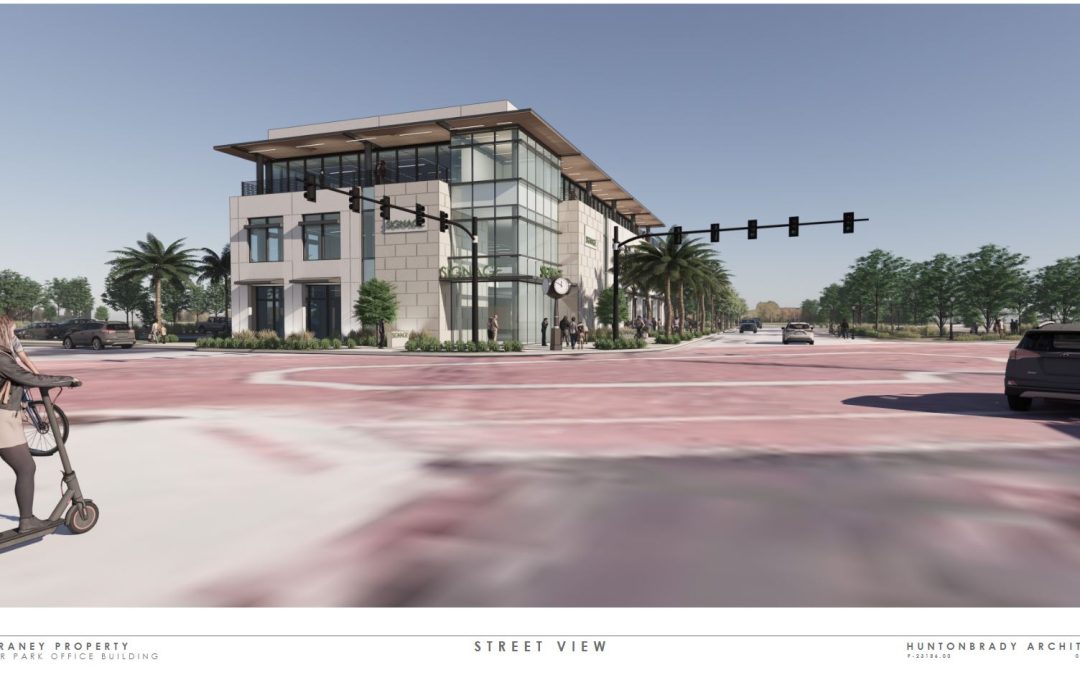
by Beth Kassab | Jan 19, 2024 | City Commission, News, Orange Avenue Overlay, Uncategorized, Zoning and Development
OAO Board approves plans for office building next to Seven Oaks Park
The city tried to buy the parcel along Orange Avenue and Denning Drive that was owned by Bank OZK, but lost out to a warehouse developer
Jan. 18, 2024
By Beth Kassab
The Orange Avenue Overlay Appearance Review Advisory Board considered plans for one of the most talked about properties in Winter Park last year — the wedge-shaped parcel that city commissioners attempted multiple times to purchase to add on to Seven Oaks Park.
The property was owned by Bank OZK and after the city’s offers were rebuffed, the vacant land was sold to warehouse developer and Winter Park resident Steven McCraney, who wants to build his company’s headquarters there.
McCraney spoke at the meeting and said he was initially working with Bank OZK to develop the property jointly — a plan that started 18 months ago, long before the city made its first offer last year.
“They decided they wanted to sell it at kind of the last minute and we were glad to be the group they decided to sell it to,” he said.
He said he’s excited about the project and expects it to “raise the bar” in the new special Orange Avenue Overlay area, which has special zoning and development standards designed to improve pedestrian access and architectural quality in the area near Orange Avenue and U.S. Highway 17-92.
The board made several recommendations for the development such as planting oak trees rather than palm trees along the main corridors for extra shade. Ultimately, they recommended approval by a 3-0 vote. Brian Canin, Tonya Mellen and Wade Miller voted in favor. Andrew Krecicki recused himself from the vote because he works for HuntonBrady Architects, which is involved in the McCraney project.
WinterParkVoiceEditor@gmail.com
To comment or read comments from others, click here →
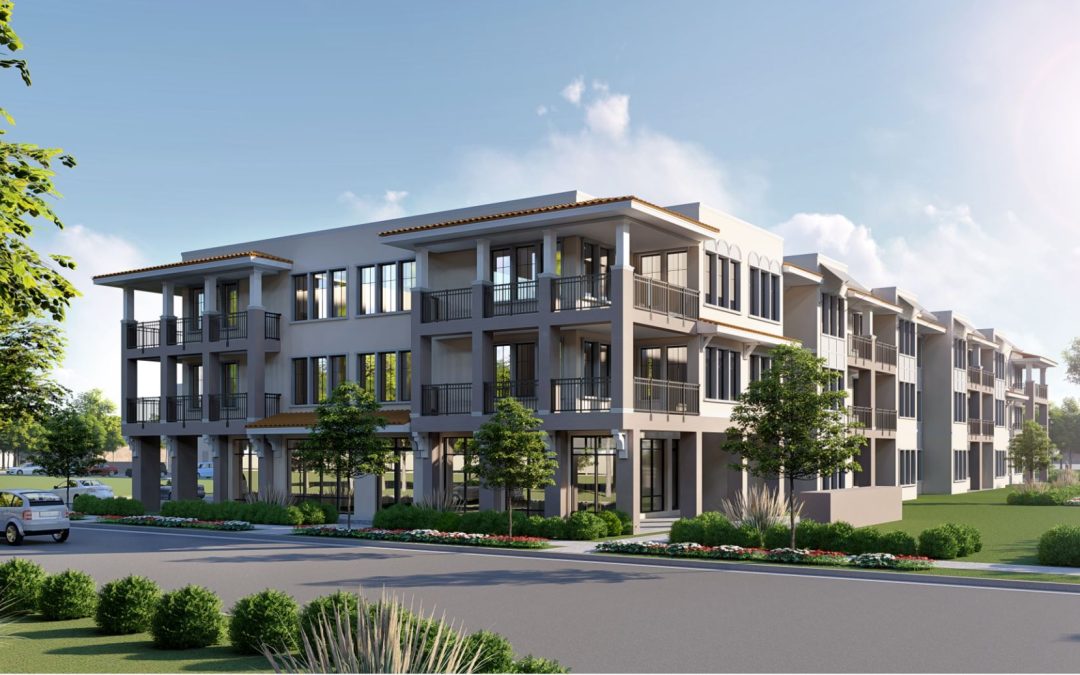
by Beth Kassab | Jan 18, 2024 | City Commission, News, Uncategorized, Zoning and Development
In close vote, P&Z board approves Rollins faculty housing project
Neighbors slam proposed architecture and say parking is inadequate
Jan. 18, 2024
By Beth Kassab
A proposed 48-unit apartment building to serve as workforce housing for Rollins College faculty and staff skidded out of a Planning & Zoning Board meeting with new conditions attached after an onslaught of complaints from residents at the nearby Douglas Grand condominiums.
The board voted 4-2 to recommend approval to the City Commission, which will consider the project next week. Jim Fitch, Vashon Sarkisian, Alex Stringfellow and David Bornstein voted yes with the added condition of restricting the number of parking passes per unit based on the number of bedrooms as well a requirement that Rollins help add on-street parking along Welbourne Avenue. Melissa Vickers and Warren Lindsey voted no.
Residents who live in the Douglas Grand and elsewhere said the project would add too many units to their neighborhood without adequate parking. Several people criticized the proposal’s architecture, wood frame construction and questioned the impact of what they called “subsidized housing” on their own property values.
Some who spoke accused the city of bowing to any request made by Rollins.
“I think we can agree this evening that if any other developer walked in to staff’s office and made a request for double units and only 77% of required parking with a noncompatible building, I think we can all agree that never would have made it to your agenda,” one speaker said. “But here we are tonight.”
Rollins President Grant Cornwell defended the project as central to the liberal arts college’s mission of providing students an intimate and quality experience with faculty and staff integrated into campus life.
He said younger, tenure-seeking faculty can’t afford to live in Winter Park and commute times can be an hour.
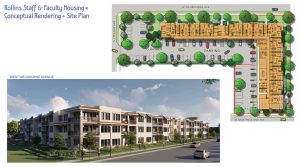
A rendering shows a faculty and staff apartment project proposed by Rollins College.
“This emerged as a way to fill a need,” he said. “Especially by younger faculty and a generation where they would like to get rid of a reliance on cars and walk to work and shopping.”
City code would typically require 124 parking spaces for the development as proposed: 2.5 spaces per unit plus four spaces for the coffee shop and bookstore. But Planning Director Jeff Briggs said the city has allowed other nearby projects to build just two spaces per unit because of the availability of on-street parking and the potential to add more on-street parking. As a result, the staff endorsed Rollins’ plan to build 97 spaces for the project.
The college is partnering with developer Alan Ginsburg on the one, two and three-bedroom units. The site along New England and Welbourne avenue is currently home to buildings known as the Dan Hunter apartments, for the mayor that developed them. Those units, which are already owned by Rollins and house graduate students today, would be torn down to make way for the new buildings.
A coffee shop and bookstore are included in the design as part of the city’s long standing rules for developing New England Avenue with a retail focus aimed at making the street attractive to pedestrians.
Rollins representatives said they would be willing to forgo the retail space in favor of a common area for residents if that was more desired by the city or neighbors.
As part of its agreement with the city, Rollins would commit to maintaining the units as faculty housing for a period of at least 20 years, a decrease from the 30 years that was in the original staff report.
WinterParkVoiceEditor@gmail.com
To comment or read comments from others, click here →
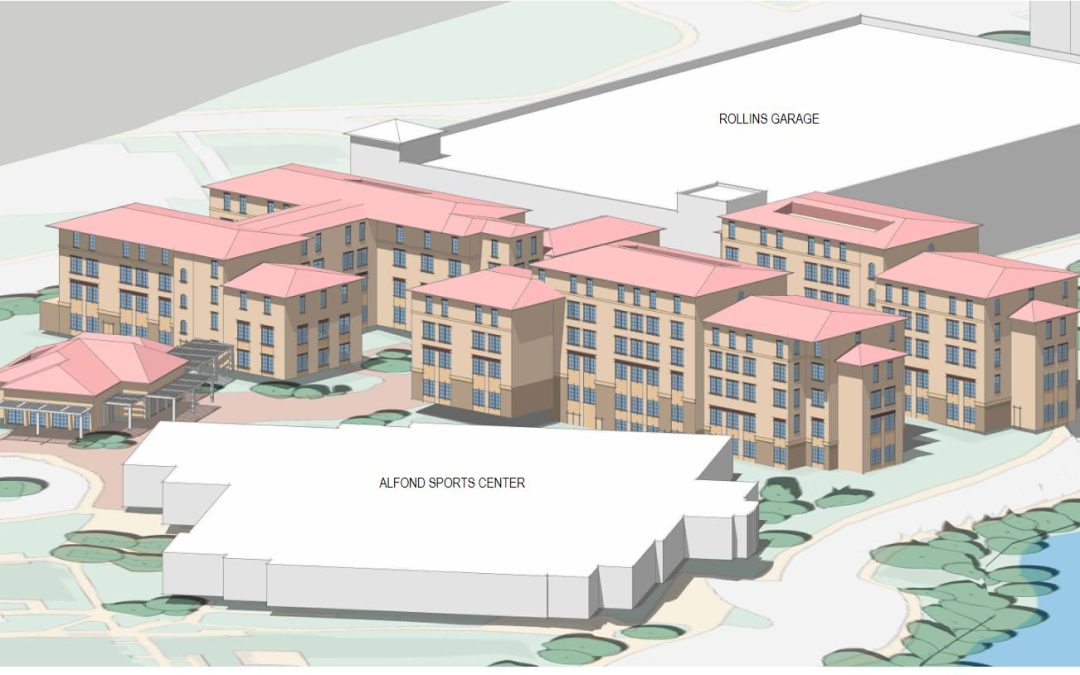
by Beth Kassab | Jan 13, 2024 | City Commission, News, Uncategorized, Zoning and Development
Updates on Rollins dorm, leaf-blower ban and Live Local Act
Angst over electric leaf blowers doesn’t stop ban set to start in July
Jan. 11, 2024
By Beth Kassab
Despite reservations over the logistics of enforcing a ban on gas-powered leaf blowers, the City Commission passed a rebate on electric version of the devices as the prohibition is set to take effect this summer.
The $50 rebate available to residents in the form of a credit on their utility bills is intended to help ease the transition.
But commissioners expressed concerns over how landscape companies would make the move.
Vice Mayor Sheila DeCiccio said she’s heard from landscapers who note they work from early in the morning until the evening with few breaks.
“They want to know about battery use,” she said. “What is the cost of the battery if they can’t recharge?”
Gloria Eby, director of natural resources and sustainability, said the city is working to prepare resources on cost comparisons and battery life.
“It becomes an upfront cost … with industry, you can’t discount that fuel has its cost,” she said. “When you do a comparison on fuel to upfront battery, then the investment is 10 months to a year, and you’ve paid off that battery cost.”
Mayor Phil Anderson noted that the ban was first enacted in 2022, but the city pushed the pause button on enforcement for 30 months until July of 2024 to give people time to prepare.
“We were really intentional about saying this was intended to allow people to make transition over a 30-month period,” he said. “I’m not sure how effective that wait period has been? … As a realist my guess is most people have not done this conversion and most contractors have not done this conversion.”
He urged city staff to take a lighter approach to enforcement with perhaps warnings and education before launching into fines.
City Manager Randy Knight said the intention is to educate residents and companies before any fines are issued.
“We don’t plan to drive around looking for violators, but we know we will get calls from people and will dispatch people immediately,” he said.
At the same meeting, Commissioners approved the plans for a new 300-bed dormitory on the Rollins College campus and observed a moment of silence for Rita Bornstein, a beloved former president of the college, who died last week.
Commissioners also approved an ordinance to help block abuse of the state’s Live Local Act when it comes to new projects billed as affordable housing.
WinterParkVoiceEditor@gmail.com
To comment or read comments from others, click here →

by Beth Kassab | Jan 5, 2024 | City Commission, News, Orange Avenue Overlay, Uncategorized, Zoning and Development
Winter Park tries to protect against abuse of state's Live Local Act
The city is taking a page from Tampa as it attempts to ensure projects provide affordable housing under state-mandated rules that are less stringent for developers
Jan. 4, 2024
By Beth Kassab
Last summer a new law took effect in Florida that appears designed to lure more developers to offer affordably-priced units as part of new projects.
But city and county leaders across the state are wary of the new rules known as the Live Local Act that take away local control over the projects — meaning the city would be forced to allow taller buildings or higher density than might typically be allowed under local regulations.
The Act overrides local zoning regulations for any housing project for which the developer declares a minimum of 40% of the units to be affordable, according to city documents.
Winter Park is just the latest local government to consider a set of provisions to try to guard against abuse of the act by attempting to ensure developers are truly providing affordable units.
The ordinance, which is based on one passed by the city of Tampa, will be considered for its second and final approval at Wednesday’s City Commission meeting.
In addition to clarifying some terms in the act, the proposed ordinance lays out an application and certification process to assure the developer continues to provide affordable units throughout the operation of the development.
“Otherwise, under the Act, one can declare that they are providing affordable housing but never demonstrate how they are doing such at any time during the initial approval process, during construction or operation for the 30 years required,” according to a memorandum from city staff. “There also are no penalties within the Act for non-compliance.”
Projects within the Orange Avenue Overlay District must also meet the applicable architectural requirements of the district and will be subject to review by Orange Avenue Overlay Appearance Review Advisory Board, according to the ordinance.
“The City may deny a project that receives a recommendation of denial or fails to meet the conditions of a recommendation for approval from the Orange Avenue Overlay Appearance Review Advisory Board,” according to the proposed rules.
WinterParkVoiceEditor@gmail.com
To comment or read comments from others, click here →












Recent Comments